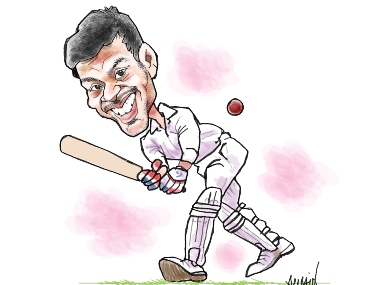Mayank Ankur Agarwal, India’s new opening sensation in Tests, is a firm believer in the ‘law of attraction’; that which materialises thoughts into reality. Into only his sixth Test match, Mayank has already scored 605 runs @ 60.50 and has a double hundred, a hundred and a few fifties to his name. The promising young batsman is somewhat like Australia’s former opener, and now coach, Justin Langer. Langer scored 7,696 runs in 105 Tests @ 45.27 and scored 23 hundreds. It may be too early to compare the two. However, Mayank’s dedication to working hard and his deep belief in ‘mind power’, which is said to have turned Langer’s career around at the turn of the millennium, augurs well for the young Bengaluruan. In his book The Power of Passion, Langer speaks of how Pat Farmer, the Australian ultra-marathon runner, visualised the finishing line even before he set off on his mentally and physically punishing runs. Once when Farmer visited the Australian dressing room, just ahead of the January 2000 Test match against India at the SCG, Langer told him of how he (Langer) averaged just 15 runs per inning at that venue and how he felt uncomfortable every time he walked out to bat there. The legendary runner urged Langer to paint a positive, ‘perfect world’ picture in his mind of what he would like to achieve in that Test match. With the persistent picture of a big hundred in his mind, Langer scored 223 and helped Australia beat India by an innings. [caption id=“attachment_7486001” align=“alignnone” width=“825”]
 Mayank’s batting is not about inborn talent; it is about grit and determination. Illustration courtesy Austin Coutinho[/caption] The Agarwals are a business community; they aren’t into sports, usually. Mayank’s father, however, advised his teenaged son to practice ‘Vipassana’, which focuses on the mind-body connection through meditation — realising the value of concentration and calmness that he would need for his batting. The young man, who had done pretty well then in the Under-19 World Cup of 2010, would however have none of that mumbo-jumbo. A couple of years later, when he felt the need to strengthen his ‘inner game’, he relented, embraced ‘Vipassana’ as a way of life and his performances began improving significantly. In 2013, when he was playing for Royal Challengers Bangalore in the Indian Premier League (IPL), Ramesh Mane (Manekaka to cricketers), the team’s acu-masseur and Man Friday, gave him a book titled The Power of Your Subconscious Mind to read. Manekaka, a good friend of mine for over 30 years, is someone who believes in the healing power of the mind, positivity and in naturopathy. This book by Joseph Murphy, that deals with the power of thoughts and beliefs to create reality, is said to have had a profound effect on Mayank’s batting. It was a kind of enlightenment for him.
Mayank’s batting is not about inborn talent; it is about grit and determination. Illustration courtesy Austin Coutinho[/caption] The Agarwals are a business community; they aren’t into sports, usually. Mayank’s father, however, advised his teenaged son to practice ‘Vipassana’, which focuses on the mind-body connection through meditation — realising the value of concentration and calmness that he would need for his batting. The young man, who had done pretty well then in the Under-19 World Cup of 2010, would however have none of that mumbo-jumbo. A couple of years later, when he felt the need to strengthen his ‘inner game’, he relented, embraced ‘Vipassana’ as a way of life and his performances began improving significantly. In 2013, when he was playing for Royal Challengers Bangalore in the Indian Premier League (IPL), Ramesh Mane (Manekaka to cricketers), the team’s acu-masseur and Man Friday, gave him a book titled The Power of Your Subconscious Mind to read. Manekaka, a good friend of mine for over 30 years, is someone who believes in the healing power of the mind, positivity and in naturopathy. This book by Joseph Murphy, that deals with the power of thoughts and beliefs to create reality, is said to have had a profound effect on Mayank’s batting. It was a kind of enlightenment for him.
He had been awakened to the fact that sporting battles are not won in any arena; they are won in the six-inch space between the ears.
“This boy was so determined to play for India and excel at that level that he would not only read books by Murphy, Rhonda Byrne and other mind experts, but he would actually meditate, get into the alpha state and repeat positive self-affirmations whenever he got the opportunity,” Manekaka tells me. “He was always on the lookout for new ways to improve his inner game. That curiosity is now paying him dividends,” he adds. According to Langer, luck is preparation plus opportunity. Wasn’t it Jack Nicklaus, the legendary golfer, who said that the harder he works, the luckier he gets? For Mayank, it has been hard work and mind training that has brought him his good fortune. Mayank is a workhorse; a cricket wonk if you like. He has worked hard on his fitness, with long-distance running being a part of his training schedule. His batting practice has been specific and limited to the shots he plays in matches. It has been about getting his bat flow, his hand-eye coordination and timing into his sub-conscious mind; his batting practice is about hundreds of repetitions to ingrain each shot into muscle memory. Mayank’s disciplined approach to his batting and his thought process has brought him success. His batting is not about inborn talent; it is about grit and determination. “Keep doing the things that are in your control,” Rahul Dravid, one of his idols, had told him. He worked hard on his skills, fitness and his mental toughness and waited, rather patiently, for the selectors to pick him. Edmund Hillary, the mountaineer once said, “It isn’t the mountain that we conquer but ourselves.” Mayank has been in sublime form over the last couple of seasons in domestic cricket. In the 2017-18 Ranji Trophy season, he scored 1,160 runs, including a triple hundred against Maharashtra. During the 2017-18 season itself, in eight Vijay Hazare Trophy matches, he scored 723 runs. After another good Vijay Hazare Trophy season of 2018-19, he was picked to be in the Indian Test team to play the itinerant West Indians. But he did not get to play in any of the matches and wasn’t included in the Indian squad that toured Australia later that year. Fortunately, for him, Prithvi Shaw twisted an ankle and Mayank was asked to replace him, Down Under. Given the chance to open in the Boxing Day Test at MCG, Mayank scored 76 runs. Since then, he has cemented his place in the Indian side with good batting performances. Opening on a track with a bit of juice, in Pune, in the second Test against South Africa recently, he played out the difficult first session against the likes of Kagiso Rabada, Vernon Philander and the pacy Anrich Nortje. It was about staying in the present moment, punishing the bad deliveries and not bothering about the score. It was about playing out time and about grit and determination. “If you know what you want, you can have it,” says Joseph Murphy. “Mayank Agarwal knows exactly what he wants from life,” avers Manekaka. “That’s the secret of his success!” The author is a caricaturist and sportswriter. A former fast bowler, coach, sports administrator and mind trainer, he believes in calling a spade a spade
Austin Coutinho is a sportswriter and cartoonist based in Mumbai. Formerly a fast bowler who was a Ranji Trophy probable in the 1980s for the city, Coutinho retired as senior manager (CRM) from Rashtriya Chemicals & Fertilizers in December 2014. Coutinho was former president of the Mumbai District Football Association, a coaching committee member of the Mumbai Cricket Association, and a member of Maharashtra’s Sport Committee. A coach and mental trainer, he has mentored some top class cricketers and footballers. Coutinho has also authored 6 books on sport and has contributed articles, cartoons and quizzes to some of the best newspapers and sports portals in the country.
)